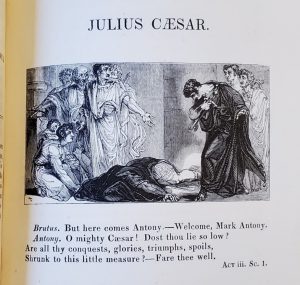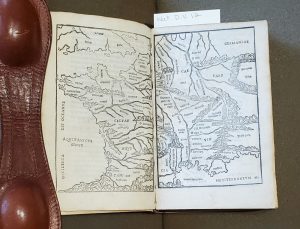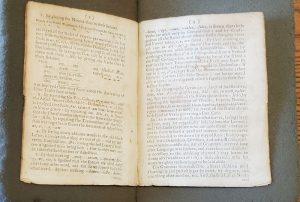By Emily Petermann, Library Assistant
If your name is Gaius Julius Caesar (and it’s 44 BC…and you’re the tyrant of Rome) you may want to stay home today. For everyone else—are you ready for the Ides of March?
The Ides is the 13th or 15th day of the month in the Roman calendar. It is the third of three named days in the Roman month: the first is the kalends, or first of each month, and the second is the nones, the 5th or 7th day of each month. The Ides of March is a particularly famous Ides—it’s the day the tyrant died. On thisday in 44 BC Julius Caesar was assassinated by 22 Roman senators. You may know his final words—according to Shakespeare—as “et tu, Brute?” or “and you, Brutus?”
To celebrate this year’s Ides, I decided to look through our holdings for Caesar and for Latin related items.
The first item that drew my attention was this 1826 volume of Shakespeare’s Works, which has some beautiful engravings. The engraving pictured below appears at the beginning of the play Julius Caesar and depicts that fateful Ides in 44 BC.

We also hold quite a few non-Shakespearean works related to Julius Caesar. The most relevant is written by Caesar himself: the MHS holds a few editions of his work “Hoc uolumine continentur haec. [C. Iulij Caesaris] Commentariorum de bello Gallico...” The title translates to “These chapters contain G. Julius Caesar’s Commentaries on the Gallic War…” This volume is Caesar’s account of multiple wars that he was involved in, with the most famous being the Gallic War.

Pictured above is an edition of Caesar’s work published by the Aldine Press, a company started by Aldus Manutius, the Venetian printer responsible for creating the italic typeface. Manutius also notably put out small and affordable editions of Latin and Greek texts, like our copy of Caesar’s work, which is the perfect size to hold in your hand.[i] Open this copy of “Commentariorum de bello Gallico…” and you can use the map of part of Western Europe to follow Caesar’s campaign through Gaul as you read!

We also hold quite a few (55!) Latin primers and readers: books intended to teach Latin to students. Quite a few of them claim to teach in new and innovative ways. I’ve taken several years of Latin, so I’m always looking for “new” ways to learn the language. My favorite of the primers is titled “A Demonstration How the Latine Tongue May be Learnt With Far Greater Ease and speed then Commonly It Is.” This primer was published in London in 1669 by Arthur Brett. Brett begins his primer with a complaint that the “older” ways of teaching Latin negatively affected student’s health. He said of the old way: “Least pouring on hard Rules should crack their brains, impair their health, and make them to nauseate all kind of knowledg[sic].”

To the modern eye, Brett’s Latin is also likely to crack our brains – he expected students to know to write “What wouldst thou have” (“What would you like?” in 17th century English) as “Nihil moror quid objicis,” instead of the apparently obviously incorrect “Quid tibi vis?” (which he translates as “What wilt thou to thee?”) It took me a few passes to figure this sentence out, thanks to 354 years of language changing- I’m glad I wasn’t learning Latin from Mr. Brett!
Finally, I thought I would look for some familiar Latin phrases-like “et tu, Brute?”- in the collection. I was excited to find a volume titled, “Adagiorum chiliades Des” by Erasumes Desiderius, which contains Latin adages and explanations for those adages broken down by the century they were common in.

One of my favorites from this collection is “Elephantum ex musca facis” or “you are making an elephant out of a fly.” This adage sounds a lot like our contemporary phrase, “you’re making a mountain out of a molehill!”
If you’re not supposed to stay inside today (looking at you, Caesar), consider visiting the Reading Room to check out some of our materials on Caesar and the Latin language. You can find out more about visiting the Reading Room here, and can request an appointment here.
[i] Kuiper, Kathleen, “Aldus Manutius” in Encyclopedia Brittanica, updated Feb. 2, 2023.

